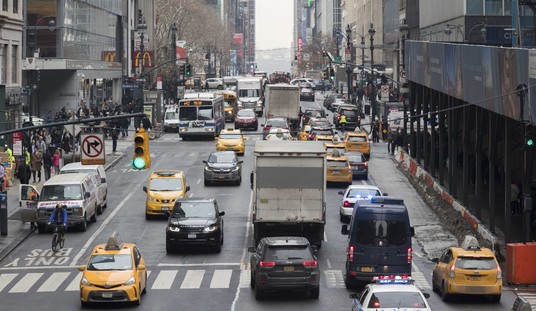The White House is enjoying a rare piece of good news in a season of disarray on foreign policy and national security. The US have finally captured the first suspected ringleader of the attack on the Benghazi consulate 21 months ago. US special forces seized Ahmed Abu Khattala in a raid this weekend in Libya, which has now been made public after all personnel have left the country:
U.S. Special Operations forces captured one of the suspected ringleaders of the terrorist attacks in Benghazi in a secret raid in Libya over the weekend, the first time one of the accused perpetrators of the 2012 assault has been apprehended, according to U.S. officials.
The officials said Ahmed Abu Khattala was captured near Benghazi by American troops, working alongside the FBI, following months of planning, and was now in U.S. custody “in a secure location outside Libya.” The officials said there were no casualties in the operation, and that all U.S. personnel involved have safely left Libya.
Khattala’s apprehension is a major victory for the Obama administration, which has been criticized for having failed so far to bring those responsible for the Benghazi attacks to justice.
One jubilant official called Khattala’s capture “a reminder that when the United States says it’s going to hold someone accountable and he will face justice, this is what we mean.”
Can’t blame them for being jubilant, but it’s not as if this should have taken 21 months, either. Khattala lived openly in Libya after the deadly attack on the State Department and CIA facilities, enjoying himself too. Michael Calderone noted last December for Huffington Post the oddity of seeing Khattala giving media interviews in Benghazi and elsewhere while the Obama administration insisted that it was doing everything it could to bring the attackers to justice:
While the U.S. government has so far been unable to catch Khattala, journalists haven’t had trouble locating him since shortly after the attack that killed four Americans, including Ambassador Christopher Stevens.
Last year, I wrote how both the New York Times and Reuters sat down with Khattala around the time he was first considered a suspect. In those reports — and in more recent ones — journalists have noted the disconnect between his status as a wanted man and casually meeting in public.
On Oct. 18, 2012, New York Times reporter David Kirkpatrick “spent two leisurely hours”with Khattala “at a crowded luxury hotel, sipping a strawberry frappe on a patio and scoffing at the threats coming from the American and Libyan governments.”
Reuters caught up with Khattala the same day and similarly reported that he didn’t appear overly concerned. “Sitting with a friend in the restaurant of a Benghazi hotel, the 41-year-old, sporting a red felt hat and a full salt-and-pepper beard, laughed gently,” wrote Hadeel Al Shalchi and Ghaith Shennib.
And that’s not the last time Khattala popped up in the western media. In August, CNN’s Arwa Damon spent two hours with him at a well-known hotel coffee shop in Benghazi. When asked on-air about locating Khattala, Damon said he’s “not a man who is in hiding.”
So yes, this is a win for the US, but it’s still going to raise questions about how much effort the US put into capturing Khattala until now. At the time of Calderone’s piece, the White House insisted that they couldn’t act without destabilizing the government in Tripoli. What’s changed since then? Last week, incoming PM Ahmad Maiteeq offered his resignation after a court ruled his election was unconstitutional and current PM Abdullah Al Thani refused to recognize his legitimacy. This hardly seems like a propitious time for a Special Forces raid if the previous delays were taken to promote stability.
The big fish still remains to be found. Abu Safian bin Qumu has long been suspected of commanding the attack, despite an inexplicable New York Times claim to the contrary. The US had bin Qumu in custody, too — until the Bush administration released him from Gitmo in 2007. This good news will serve as a reminder of the dangers of releasing terrorists back into the war, a reminder that the White House probably would prefer to avoid at the moment.
Update: It’s worth noting that the Libyan government arrested Faraj al-Shibli in March 2013 in connection to the attack, and allowed the FBI to interrogate him. To date, though, the US has not taken Shibli into custody, or at least no such report comes up on a search.
Update: It’s the first suspect in the attack to be taken into US custody, but not the first US arrest, as Jeff Dunetz points out. That arrest took place in my old hometown of Cerritos, California, and put a YouTube filmmaker behind bars — ostensibly for parole violations, but more accurately for thoughtcrime and political expediency.
Update: Barack Obama says this demonstrates American resolve:
Pres. Obama on Benghazi suspect capture: US shows "we will do whatever it takes to see that justice is done when people harm Americans."
— ABC News (@ABC) June 17, 2014
What did the previous 21 months of Khattala holding court with American media demonstrate?








Join the conversation as a VIP Member